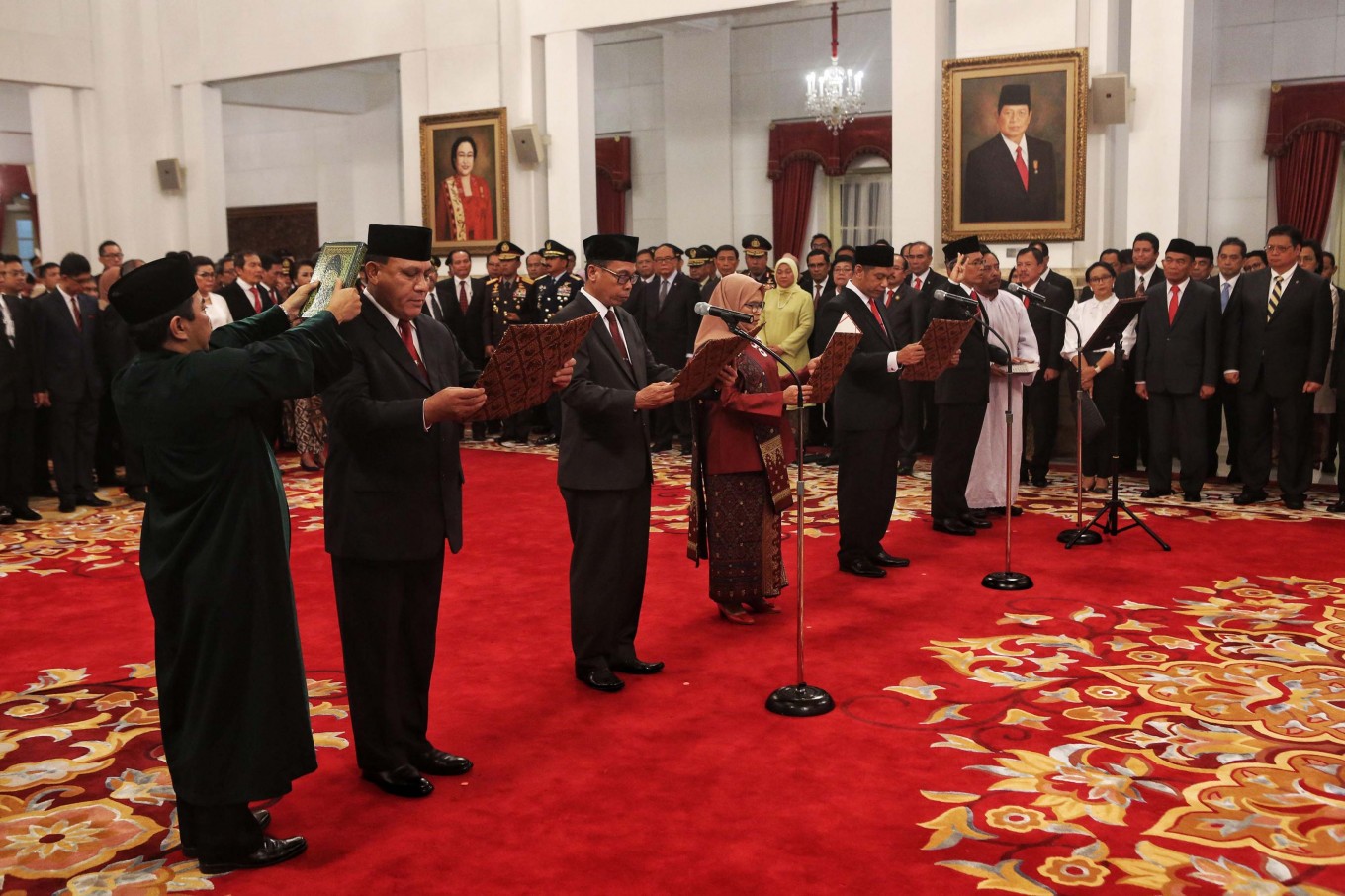Popular Reads
Top Results
Can't find what you're looking for?
View all search resultsPopular Reads
Top Results
Can't find what you're looking for?
View all search resultsKPK’s new era
The public has cast doubt over whether the newly installed KPK leaders, chairman Comr. Gen. Firli Bahuri and his deputies will make a difference. Such pessimism, however, should not matter to them as the public has always set the bar very high in the war on corruption.
Change text size
Gift Premium Articles
to Anyone
 In the same ceremony, the five new KPK commissioners for 2019 to 2023, also took their oaths of office. Police general Comr. Gen. Firli Bahuri will lead the KPK, replacing former chairman Agus Rahardjo. Meanwhile, Lili Pintauli Siregar, Nawawi Pomolango, Nurul Ghufron and Alexander Marwata were also sworn in. (JP/Seto Wardhana)
In the same ceremony, the five new KPK commissioners for 2019 to 2023, also took their oaths of office. Police general Comr. Gen. Firli Bahuri will lead the KPK, replacing former chairman Agus Rahardjo. Meanwhile, Lili Pintauli Siregar, Nawawi Pomolango, Nurul Ghufron and Alexander Marwata were also sworn in. (JP/Seto Wardhana)
G
one are the massive (and deadly) protests to demand revocation of the revised Corruption Eradication Commission (KPK) Law and criticisms against the election of KPK leaders who will serve for the coming four years. The new law stays and the five KPK commissioners and five members of the newly established KPK supervisory council were sworn in on Friday.
The controversy plaguing the new KPK Law and the new KPK leaders aside, the fight against entrenched corruption in the country must not stop. In particular, the anticorruption drive is becoming more challenging than ever following a series of court decisions that reduced and exonerated graft convicts and suspects. Worse, graft convicts can now expect President Joko "Jokowi" Widodo’s mercy as in the case of former Riau governor Annas Maamun, who had his prison term cut by one year due to old age and health reasons.
The environment looks less encouraging for the corruption eradication campaign to live up to the mandate of the reforms more than 20 years ago, which envisioned strict, undiscriminating enforcement of the law against those stealing state money. Such a vision was behind the formation of the KPK in 2003, and history has shown how the ruthless graft busters hunted down and brought to justice corrupt government officials, politicians, businesspeople and well-connected people.
It is not the first time that newly installed KPK leaders have begun their term amid low public trust and uphill challenges. The former prosecutor Antasari Azhar had questionable integrity but became a hero nevertheless for his daredevil moves against figures known as corrupt untouchables.
The public has cast doubt over whether the newly installed KPK leaders, chairman Comr. Gen. Firli Bahuri and his deputies will make a difference. Such pessimism, however, should not matter to them as the public has always set the bar very high in the war on corruption.
Indonesia’s corruption perception index has not improved significantly despite the arrest of hundreds of governors, mayors, regents and judges, not to mention leaders of political parties and speakers of the House of Representatives and Regional Representatives Council. The new KPK leaders are responsible for finding a new anticorruption strategy that can be an effective deterrent against committing, or even attempting to commit, graft.
All in all, the new KPK leaders only need to prove their doubters wrong by showing not only their merit, but also, and more importantly, independence.
In this regard the KPK supervisory council can play its role. The oversight body will be considered relevant if it can ensure the KPK commissioners work in a professional manner and are free from outside intervention. The credentials of the council members — former Supreme Court justice Artidjo Alkostar, former KPK chairman Tumpak Hatorangan, former Constitutional Court justice Harjono, judge Albertina Ho and political scientist Syamsuddin Haris — should convince the public, but an effective anticorruption strategy depends on a good system rather than good people.
As the KPK marks a new era, this country’s commitment to corruption eradication should remain unchanged.









